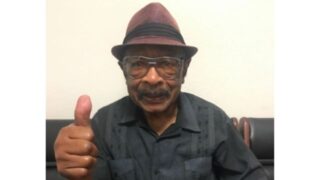Several lawsuits promoted by the National Network of Lawyers were based on clearly fraudulent claims. Courts were biased, and they won some—but lost others.
by Masumi Fukuda
Article 3 of 4. Read article 1 and article 2.


In August 1987, Mr. S, then 75 years old, of Mizuguchi Town, Koka County, Shiga Prefecture, had purchased a miniature pagoda for her ancestor’s memorial service. She became concerned because of the media frenzy and visited the Shiga Prefectural Government’s sub-office.
She was immediately taken to a Consumer Affairs Center in Kusatsu, and from there she was directed to the “Shiga No. 1 Law Firm” in front of JR West Japan’s Otsu Station.
This law firm was affiliated with the Communist Party, and at the time, it handled all consultations on “spiritual sales” in the prefecture. Mrs. S noticed a stack of “Shimbun Akahata” [“Red Flag,” the newspaper of the Communist Party of Japan] in the office, which made her uncomfortable. However, at the recommendation of Lawyer Kyoko Ogawa, who introduced himself as “the lawyer in charge,” and a prefectural official, she signed a contract entrusting Ogawa with negotiations on the return of the money she had paid for the pagoda, without fully understanding what they were all about.
Later, however, the lawyer came to her house with Tetsuro Tatsuno, then a journalist of the “Asahi Shimbun,” without any notice. Mrs. S realized that the contract was structured so that the lawyer would be paid a fee even if Mrs. S negotiated personally and received a refund. She decided to revoke the power of attorney she had given to lawyer Ogawa.
Mrs. S told a journalist from “Sekai Nippo,” “Those people say they are on the side of the victims, but I think their real purpose is to spread bad news about the ‘spiritual sales’ and destroy the Family Federation, and to increase the lawyers’ own income.”
The National Network of Lawyers Against Spiritual Sales claims that the damage caused by “spiritual sales” has been enormous. It is true that some aggressive sales techniques may have been used. However, if there really were so many victims, there would be no need to use such a devious technique to make up victims in the first place. Incidentally, the Network’s lawyers may still be using this technique today.
Since the mother of Tetsuya Yamagami, who killed former Prime Minister Abe, donated more than 100 million yen to the former Unification Church, critics are accusing the church of soliciting extravagant donations. Those who are not familiar with religions may think that a donation of 100 million yen must come from a fraud, or a financial exploitation by the former Unification Church based on “brainwashing.” However, this is not true.


For almost all religions, including the former Unification Church, donations, endowments, and charitable gifts are expressions of piety and are offered willingly to God. For example, not a few overseas Christians donated vast tracts of land or even their entire wealth before the end of their lives and died penniless. Will their relatives sue the religious corporations for depriving them of the inheritance they expected to inherit?
It is not unusual for other religious corporations to receive donations of hundreds of millions of yen. It is problematic to unilaterally criticize only large donations made for the altruistic reason of “promoting world peace” or “the good of humanity.”
Unfortunately, however, even if the donors are convinced at the time of the donation that they are donating freely, as time goes by, their faith may wane. Their relatives may rush to the National Network of Lawyers Against Spiritual Sales to recover the donation. The donors may be persuaded by lawyers from the Communist Party of Japan or the former Socialist Party that they have been “deceived,” and a lawsuit against the religious organization for the return of the donation may follow. In fact, there are many cases in which relatives consulted with the Network on how to force the donors-believers to sue.
In the past, the Family Federation has faced 169 donation lawsuits. According to lawyer Tatsuki Nakayama, the MEXT considered 22 of these cases where the church had been regarded as responsible for vicarious liability and examined where they could be used as a basis for the dissolution case. However, when Nakayama analyzed the cases one by one, he found that the Family Federation had won 50% of them. Considering all the 169 cases, the rate of victory was 30%.
When reading the plaintiffs’ court statements from the early years of the cases, we constantly find the same claims, such as “The plaintiffs were persuaded to donate money by stirring up anxiety and fear that their deceased husbands should be rescued from hell,” “The plaintiffs were told that their children’s and grandchildren’s illness and misfortune were caused by their ancestors’ karma,” “The donations were made under threat of baseless stories about karma,” and so on.
In other words, in almost every lawsuit, the lawyers, as if they copied the same sentences from one case to the other, kept claiming that the plaintiffs were intimidated into donating by creating “awe and misunderstanding” through an emphasis on ancestral karma and fear of hell.
At first, no matter how much evidence and arguments were submitted by the church to refute them, the plaintiffs’ claims were accepted at face value.
Here are some examples of court decisions that were clearly unjust.
In 1996, the former Unification Church lost a donation lawsuit for the first time at Fukuoka District Court. According to the church, one of the plaintiffs, N, learned about its doctrines after she lost her husband. She was impressed by the teachings, and after joining the church, she made donations to contribute to the development of the Unification movement. However, N’s relatives and others urged her to give up her faith or they would take her only daughter and raise her themselves. Pressured by them, she filed a lawsuit against the church.
At the trial, plaintiff N claimed that she donated because the believers told her that her late husband in the spirit world would suffer in hell if she did not make a donation. This was in total contradiction to the testimony of the believers. The Fukuoka District Court awarded the plaintiff 35 million yen in damages. In addition to the lack of any objective evidence, the court ignored the religious nature of the case, and found for the plaintiff” based on a very secular rule of thumb: “It is impossible for a believer to make such a large donation within a short period of joining the church.” [The original text of the judgment states, “It is extremely difficult to imagine that anyone would respond to a sudden request for an extremely large donation of 30 million yen.” The statement “within a short period of joining the church” in this article is an expression of the rule of thumb adopted by the court, and does not literally correspond to the original text of the judgment, which is based on the idea that only in the case of a a person who had faith for many years it would not be unnatural for her to make a large donation when suddenly told to do so].


On August 21, 2002, the Tokyo District Court ordered the church to pay 3.7 million yen in damages to the plaintiff, a former believer called T, who had claimed that she had donated 1 million yen based on an illegal solicitation. In her written statement, T asserted that in the past, when Japan ruled Korea as a colony, T’s uncle worked for the Japanese police there. When she told this story to O, a believer of the Family Federation, O accused T, explaining that her family had committed an irreparable sin and that the illness of a child of a relative was caused by her uncle’s torture of the Korean people. O urged T to donate money, saying that if she did not donate all her money, her ancestors would accuse her when she would go to the spirit world.
However, other evidence revealed that T had discovered that her uncle had worked for the Japanese police in Korea only after she had made the donation. In other words, her statement was a complete fiction referring to facts she could not have known at the time of the donation.
Surprisingly, however, the Tokyo District Court found that believer O had cursed and threatened her, saying that “T’s family had committed tremendous crimes” and “sins. [The judgment found that believer O persistently told plaintiff T to “Donate money to compensate for his ancestor’s sins,” “The ancestor wants you to make amends for his sins,” “Your ancestor will be saved by your donation,” “Your attachment to money and material things is evidence on an evil mind,” “You cannot make amends for his sins unless you cut off such evil mind,” “If you don’t do so, you will go to hell when you go to the spirit world and be blamed by the ancestor,” etc. The article offers a short summary of these statements for the sake of conciseness].
The court accepted T’s statement even though it was clear that there were no threatening remarks. This was clearly an unfair judgment.
On January 13, 2016, the Tokyo District Court found that K, a member of the Family Federation, had donated her husband’s bank deposits without his permission and ordered the church to pay approximately 34.3 million yen. K’s ex-husband filed a lawsuit against the church after he and K divorced. His ex-wife K denied the fact that she had donated money to the church. However, the judge found that all the money listed in her ex-husband’s bank passbook, for which the purpose of the use cannot be proved, was a donation to the church by the wife. The judge then held the organization liable, on the grounds that it must have known that the donations were the ex-husband’s property, and that K was donating against his will.
Surprisingly, however, while aware of how the church was organized, the court did not clarify the facts, such as which executives or members of the church received the donations. It could be said that the judges made their decision based on mere speculation.


On the other hand, there have been cases in which the court found clear perjury and falsification of evidence by the plaintiffs, and the church won.
In a lawsuit, former believer A sought compensation for damages at the Nagoya District Court. She claimed that she had donated 10 million yen to the church due to baseless karma stories and other threats by fellow believers. However, the claim was dismissed on February 28, 2003. Subsequently, the High Court and the Supreme Court upheld the District Court’s decision, and the church completely won the case.
In the plaintiff A’s written statement, she stated that she had donated a large amount of money to the organization because the believers told her stories about the karma of her love affairs, the karma of killing and wounding others, the karma of an unborn baby, and so on, so she was instilled with fear. However, during the dispute, plaintiff A visited a facility related to the church, where a believer showed her a statement allegedly written by A and confirmed its contents one by one.
According to the believer, “Mrs. A’s statement said that the church had repeatedly threatened her a lot, starting with the study in a video center. However, when I asked her about her remarks in the written statement, she denied almost all of them. So, I recorded what she said and submitted it to the court as evidence.”
The believer reported that the examination of Mrs. A at trial was at follows. “She was asked, ‘Your statement says you were threatened to make donations. Is it correct?’ Then she clearly answered, ‘No, it is not correct.’ ‘Then this statement was not written by you?’ ‘No, I didn’t write it.’ ‘Then there is no point of asking any more questions.’ ‘Yes.’ At that moment, the presiding judge’s face turned very pale. He was disappointed that he had no choice but to let the church win the case.”








